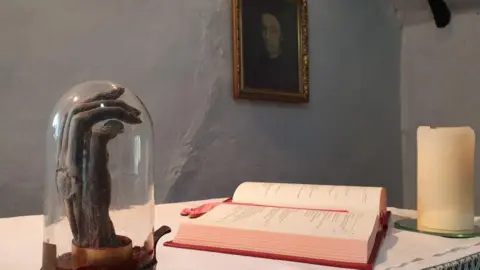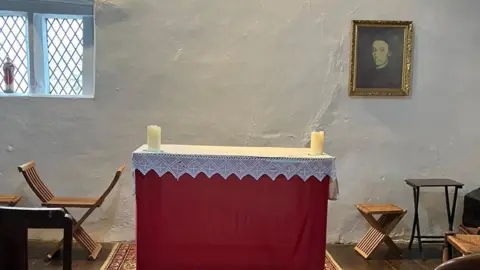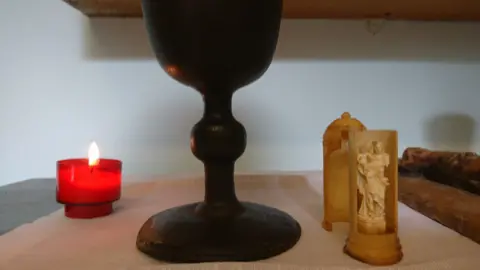The annual journey of a saint's 440-year-old hand
 Claire Ashmore/BBC
Claire Ashmore/BBCEarly 17th century England was a dangerous place to be member of the Roman Catholic faith.
The religion was outlawed, and priests such as Edmund Arrowsmith paid the ultimate price for their beliefs.
Knowing he would be tortured and executed if he held masses, he travelled the north-west of England on horseback and in heavy disguise.
He was killed in 1628, but to this day, Catholics in the region have a lasting reminder of him - his mummified hand.
It rests inside a small, glass-domed case and is often transported between the St Oswald and Edmund Arrowsmith church in Ashton-in-Makerfield, near Wigan, to the picturesque Arrowsmith cottage in the Lancashire village of Brindle.
The man charged with the responsibility for the unusual cargo is Canon John Gorman, parish priest in Ashton-In-Makerfield.
"I feel like I am the custodian of his legacy and it is a very big responsibility," he says.
 Claire Ashmore/BBC
Claire Ashmore/BBCFr Gorman, a canon of Liverpool Archdiocese, recently celebrated Mass in the upper room in Brindle where Arrowsmith said his last Mass.
Every year, on the anniversary of his execution, hundreds of Catholics flock to the church that bears Arrowsmith's name.
Mass is said and parishioners have the chance to be blessed with the hand.
The next day, the hand is sometimes taken to St Joseph's RC Church Brindle, and worshippers there retrace Arrowsmith's last ride with a walk over the marshland where he was eventually captured as he was thrown from his horse while trying to escape his pursuers.
The commemoration culminates with a Mass in St Joseph's.
But this year's ceremony could be the last, as the church is threatened with closure.
 Paul Burnell/BBC
Paul Burnell/BBCArrowsmith was born in 1585 and was steeped in Catholic heritage.
His parents were jailed and his uncle, Fr John Gerard, once escaped from the Tower Of London.
After Arrowsmith's capture he was hanged until nearly unconscious before being cut down and dragged through the streets of Lancaster on a hurdle.
He was then quartered and his body parts displayed to scare others from defying King Charles I.
Devotees would salvage these relics, and they were passed down through the generations.
Such was how the hand of Arrowsmith - one of the 40 English martyrs canonised by Pope Paul VI in 1970 - came to be in Ashton-in-Makerfield.
"We are not likely to be executed for our faith, but what we believe is not popular in the current climate," says Fr Gorman.
"We all have to have the same fidelity of St Edmund."
Listen to the best of BBC Radio Lancashire on Sounds and follow BBC Lancashire on Facebook, X and Instagram. You can also send story ideas via Whatsapp to 0808 100 2230.
